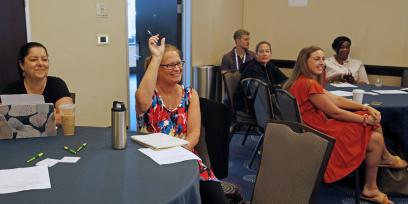Although it may be a worn-out phrase, it truly takes a village to raise a child. That is especially evident in schools, where so many stakeholders touch the lives of students. At the July 22 TEACH workshop “Where Is the Love? Building Family-Educator-Student Partnerships to Get What Kids and Communities Need,” AFT staff joined leaders from the National PTA and its Austin, Texas, affiliate to focus on strengthening one of the most important connections for students: the partnerships between families and educators.
Participants practiced interacting with “parents” in role-play exercises, exploring how to talk about difficult and realistic challenges that can arise in schools, such as a language barrier or a grandparent unfamiliar with the school system. Tapping the expertise in the room, the conversation deepened as members shared actual situations they’ve experienced and the solutions they’ve come up with themselves.
One takeaway was that communicating and connecting with parents, grandparents and other family members is most successful when those people are treated as partners, peers and resources. Ultimately, “parents are your greatest assets,” as one participant said. Another suggested educators say things like, “You are the expert on your child, tell me what he needs,” and then listen carefully to the answers.
Helen Westmoreland, director of family engagement for the National PTA, shared basic strategies for connection, including effective communication—not just phone calls to the family when a child is acting out, but calls when they are doing well; supporting student success (by prioritizing it over fundraisers and volunteering, for example); speaking up for every child (by making sure all families feel as though they can speak up); sharing power (ensuring families understand how to navigate the school system); and collaborating with other community groups.
Those collaborations come at all levels, said Laurie Solis, of the Austin Council of PTAs. Austin, for example, provides free bus passes for students who have trouble getting to school, and the public library distributes free library cards through the school. At individual schools, parent volunteers are recognized with certificates of achievement that some have used to advance their immigration status.
Westmoreland talked about home visits as another powerful way to connect, outlining best practices like making all visits voluntary; training and compensating participating educators; actively sharing families’ hopes, dreams and goals; and making visits in pairs, reflecting together on the experience afterward.
Liz Steinhauser, a parent engagement organizer for the AFT, described parent mentor programs as another effective way to collaborate. This approach trains and pays parents to be present in classrooms with teachers who have requested them, helping with small tasks and building strong relationships along the way.
Workshop participants came away with lists of ideas for connecting with parents and caregivers, from ensuring all families are invited to engage, to being empathetic listeners and recognizing family expertise. Many of the suggestions came from the workshop participants themselves, who talked about how important it was for them to connect with one another as well. “So many times we think we’re in this alone,” said Misty C. Santo, a New York City pre-K teacher and a member of the United Federation of Teachers.
[Virginia Myers]

